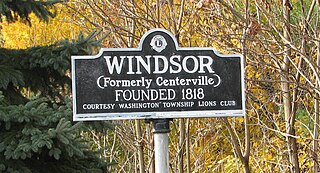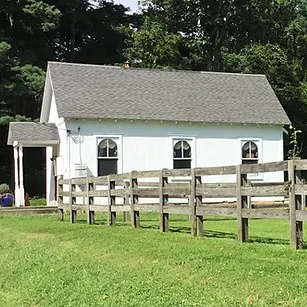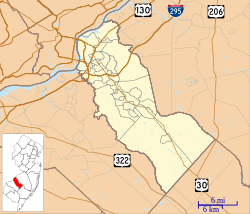
Blackwood is an unincorporated community and census-designated place (CDP) located within Gloucester Township, in Camden County, in the U.S. state of New Jersey. As of the 2010 United States census, Blackwood's population was 4,545. It is located 10 miles (16 km) from the city of Camden and 14.6 miles (23.5 km) away from Philadelphia in the South Jersey region of the state.

Chesilhurst is a borough in Camden County, in the U.S. state of New Jersey. As of the 2020 United States census, the borough's population was 1,536, a decrease of 98 (−6.0%) from the 2010 census count of 1,634, which in turn reflected an increase of 114 (+7.5%) from the 1,520 counted in the 2000 census.

Winslow Township is a township in Camden County, in the U.S. state of New Jersey. As of the 2020 United States census, the township's population was 39,907, an increase of 408 (+1.0%) from the 2010 census count of 39,499, which in turn reflected an increase of 4,888 (+14.1%) from the 34,611 counted in the 2000 census.

Brick Church is an active commuter railroad station in the city of East Orange, Essex County, New Jersey. The station, one of two in East Orange, is located next to the Temple of Unified Christians Brick Church, designed with brick architecture. The other station, located 0.6 miles (0.97 km) to the east, is the namesake East Orange stop. Trains from the station head east on New Jersey Transit's Morristown Line and Gladstone Branch to New York Penn Station and Hoboken Terminal while westbound trains service stops out to Gladstone and Hackettstown. Like its sister station, Brick Church contains three tracks and two platforms. However, it is not accessible for the handicapped.

Windsor is a small historic unincorporated community and census-designated place (CDP) located within Robbinsville Township in Mercer County, in the U.S. state of New Jersey. The area is served as United States Postal Service ZIP Code 08561. As of the 2020 United States census, the CDP's population was 330, an increase of 104 (+46.0%) above the 226 counted at the 2010 census. The community, covering 570 acres (230 ha), was added to the National Register of Historic Places in 1992.

Harriet Tubman National Historical Park is a US historical park in Auburn and Fleming, New York. Associated with the life of Harriet Tubman, it has three properties: the Harriet Tubman Home for the Aged, in Auburn; the nearby Harriet Tubman Residence, just across the city/town line in Fleming; and the Thompson A.M.E. Zion Church in Auburn. They are located at 180 and 182 South Street and 90 Franklin Street, respectively. The Zion Church unit is administered by the National Park Service (NPS), and the South Street properties, including a historic barn and a visitor center, are jointly managed and operated by both the NPS and the Harriet Tubman Home, Inc. The church also works with the NPS in park operations. The Harriet Tubman Grave, in nearby Fort Hill Cemetery, is not part of the park.

The Gabreil Daveis Tavern House, also known as the Hillman Hospital House, is a historic building in the Glendora section of Gloucester Township, Camden County, New Jersey, United States. This tavern was built in 1756 near the Big Timber Creek and housed boatmen who used the creek to ship goods to Philadelphia. It was designated a hospital by George Washington during the Revolutionary War.

The Dr. William Barrow Mansion is located at 83 Wayne Street between Barrow Street and Jersey Avenue in Downtown Jersey City, Hudson County, New Jersey, United States. The mansion was added to the National Register of Historic Places on May 2, 1977, and is located within the Van Vorst Park Historic District, which itself was dedicated on March 5, 1980, and is roughly bounded by Railroad Avenue, and Henderson, Grand, Bright, and Monmouth Streets.

Glendale Methodist Episcopal Church is a historic church at 615 Haddonfield-Berlin Road, at the junction with White Horse Road, in the Glendale section of Voorhees Township, Camden County, New Jersey, United States. It was added to the National Register of Historic Places on August 4, 1995 for its significance in community planning, development, and education from 1855 to 1920. At the time of its construction, the village of Glendale was impacted by the train station stop of Ashland on the Camden Atlantic Railroad. Because of the railroad, Philadelphians and shore villagers came to trade and do business.

Solomon Wesley United Methodist Church is a historic church at 291-B Davistown Road / Asyla Road in the Blackwood section of Gloucester Township, Camden County, New Jersey, United States.

Star Hill AME Church, also known as Star of the East Church, is a historic African Methodist Episcopal (AME) church building and cemetery located in Dover, Delaware near Camden, Kent County, Delaware. It was constructed about 1866, and is a one-story, three-bay by three-bay, gable roofed, frame building in a vernacular Gothic Revival-style. It features a small bell tower at the roof ridge. Interments in the adjacent cemetery are believed to begin with the founding of the church in the 1860s, but the earliest marked grave dates from the early 1890s.

Zion African Methodist Episcopal Church is a historic African Methodist Episcopal (AME) church and cemetery located at Camden, Kent County, Delaware. It was originally built in 1845 and re-built after a fire in 1889. The one-story, gable roofed frame Classical Revival-style church rests on a brick foundation. It measures 28 feet, 3 inches, wide and 36 feet, 2 inches in length. The ground around the church has been used as a cemetery since the church was established. The church is an important focal point of the community of Star Hill, an early community of African American settlement in Kent County. Zion was the first African Methodist Episcopal church in Camden, and is the mother church of nearby Star Hill AME Church.

Berlin, also known as the Long-a-Coming Depot, is located in Berlin, Camden County, New Jersey, United States, between East Taunton and Washington Avenues, abutting the New Jersey Transit Atlantic City Line tracks. The station was built in 1856 and added to the National Register of Historic Places on February 14, 1997 for its significance in transportation.

Hackney Chapel AME Zion Church, also known as Unitia AME Zion Church, is a historic African-American church in rural Loudon County, Tennessee. The adjacent cemetery has about 100 marked graves and up to 200 unmarked graves. The church and cemetery were added to the National Register of Historic Places in 2000.

Cooper Library in Johnson Park is located in the Cooper Grant section of Camden, Camden County, New Jersey, United States. It was built in 1916 and was added to the National Register of Historic Places on March 11, 1980, for its significance in architecture, art, education, and sculpture. It is part of Rutgers University–Camden.

Charles Alling Gifford was an American architect and a partner in the New York City firm of Gifford & Bates. He is best remembered for his resort hotels, but also designed houses, churches, and five armories for the New Jersey National Guard.

Mount Vernon Triangle is a neighborhood and community improvement district in the northwest quadrant of Washington, D.C. Originally a working-class neighborhood established in the 19th century, present-day Mount Vernon Triangle experienced a decline in the mid-20th century as it transitioned from residential to commercial and industrial use. The neighborhood has undergone significant and rapid redevelopment in the 21st century. It now consists mostly of high-rise condominium, apartment and office buildings. Several historic buildings in the neighborhood have been preserved and are listed on the National Register of Historic Places. Mount Vernon Triangle is now considered a good example of urban planning and a walkable neighborhood.

The Stoutsburg Sourland African American Museum (SSAAM) is a history museum located in the Skillman section of Montgomery Township, New Jersey, United States. The museum is located at the Mount Zion African Methodist Episcopal Church, an African Methodist Episcopal church constructed in 1899. The church was added to the National Register of Historic Places on June 7, 2021.

Peter Mott House is an historic home that is the oldest standing residence in Lawnside, New Jersey. It was the home of Peter and Eliza Mott, a freed Black farmer, carpenter, pastor, and a "stationmaster" on the Underground Railroad. It is located in close proximity to Interstate 295, the New Jersey Turnpike, and the White Horse Pike.























